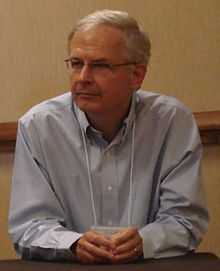George Truskey
| George Alexander Truskey | |
|---|---|
 | |
| Born |
February 14, 1957 Pennsylvania, US |
| Nationality | American |
| Fields | Biomedical Engineering |
| Institutions | Duke University |
| Alma mater |
Massachusetts Institute of Technology University of Pennsylvania |
| Doctoral advisor | Clark K. Colton |
| Known for |
transport phenomena cardiovascular tissue engineering cell adhesion atherosclerosis |
| Notable awards |
American Heart Association Fellow (1999) AIMBE Fellow (1999) BMES Fellow (2006) |
|
Website Truskey Lab Website | |
George Alexander Truskey is an American biomedical engineer noted for his research on transport phenomena in biological systems, cardiovascular tissue engineering, and cell adhesion to natural and synthetic surfaces.
Biography
George Truskey received his B.S.E. in Bioengineering from the University of Pennsylvania in 1979. He then received his Ph.D. in Chemical Engineering from the Massachusetts Institute of Technology in 1985 under the direction of Clark K. Colton. Upon graduation, he became a research fellow at Brigham and Women's Hospital in Experimental Pathology, as well as an Assistant Professor in the Department of Chemical Engineering at Tufts University. In 1987, he joined the faculty at Duke University as an Assistant Professor of Biomedical Engineering. From 2008-2010, he was the President of the Biomedical Engineering Society (BMES).[1] He is the current R. Eugene and Susie E. Goodson Professor of Biomedical Engineering and the Senior Associate Dean of Research in the Pratt School of Engineering.[2] In 2014, he successfully chaired the committee to appointment a new provost for Duke University.[3]
Notable research contributions
Truskey is the author of over 100 peer-reviewed research publications, a biomedical engineering textbook entitled Transport Phenomena in Biological Systems,[4] over 6 book chapters, and over 180 research abstracts and presentations. His textbook has received positive feedback, with reviewers stating "While there are several other excellent books available on 'Transport Phenomena,' this is the only one that truly integrates biomedical engineering and physiology with basic principles of transport phenomena in a comprehensive manner."[5] He directed Duke University's Translational Research Partnership with the Coulter Foundation, which added $10 million to the endowment of Duke's Pratt School of Engineering.[6] The goal of the partnership is to promote translational research in Biomedical Engineering.[7]
Current research
In 2012, Truskey was awarded 1 of 12 awards for NIH's new Tissue Chip and Drug Screening initiative.[8][9][10] These projects were also featured in a special supplement in Stem Cell Research and Therapy.[11] His current research also includes point-of-care endothelial cell seeding of nitinol stents and titanium devices to reduce restenosis complications.[12][13] His lab is also examining the effect of cell aging on endothelial permeability and mechanotransduction.[14][15]
Awards and appointments
- BMES Distinguished Service Award, 2012[16]
- BMES President, 2008-2010[17]
- Capers and Marion McDonald Award for Excellence in Mentoring, 2007[18]
- BMES Fellow, 2006[19]
- Chair of Department of Biomedical Engineering at Duke University, 2003-2011[20]
- AHA Fellow, 1999
- AIMBE Fellow, 1999
- Tau Beta Pi North Carolina Gamma Chapter Excellence in Teaching Award, 1998
References
- ↑ "Truskey Accepts Gavel". BMES Bulletin 32 (4): 1. 2008.
- ↑ "George A. Truskey, Duke Biomedical Engineering Department".
- ↑ "Sally Kornbluth to follow Peter Lange as new provost". Duke Chronicle.
- ↑ Truskey, George; Yuan F; Katz D (2009). Transport Phenomena in Biological Systems (Second ed.). Prentice Hall. p. 888. ISBN 978-0131569881.
- ↑ Tarbell, John. "Book Review: Transport Phenomena in Biological Systems" (PDF). Annals of Biomedical Engineering. Retrieved 14 March 2014.
- ↑ "$20 Million Endowment for Biomedical Engineering Research".
- ↑ "Partnership Award: Wallace H. Coulter Foundation". Retrieved 14 March 2014.
- ↑ "NIH Funds Development of Tissue Chip to Help Predict Drug Safety".
- ↑ "Tissue Chip Awards: Model Systems". NIH. Retrieved 14 March 2014.
- ↑ "2012 Tissue Chip Project Awards". NIH. Retrieved 14 March 2014.
- ↑ "Stem cells on bioengineered microphysiological platforms for disease modeling and drug testing". Stem Cell Research and Therapy.
- ↑ Jantzen, Alexandra; Whitney Lane, Shawn Gage, Justin Haseltine, Lauren Galinat, Ryan Jamiolkowski, Fu-Hsiung Lin, George Truskey, Hardean Achneck (September 9, 2011). "Autologous endothelial progenitor cell-seeding technology and biocompatibility testing for cardiovascular devices in large animal model". Journal of Visualized Experiments 55 (3197). doi:10.3791/3197. Retrieved 14 March 2014.
- ↑ Jantzen, Alexandra; Whitney Lane, Shawn Gage, Ryan Jamiolkowski, Justin Haseltine, Lauren Galinat, Fu-Hsiung Lin, Jeffrey Lawson, George Truskey, Hardean Achneck (August 15, 2011). "Use of autologous blood-derived endothelial progenitor cells at point-of-care to protect against implant thrombosis in a large animal mode". Biomaterials 32 (33): 8356–8363. doi:10.1016/j.biomaterials.2011.07.066. PMC 3215272. PMID 21840592. Retrieved 14 March 2014.
- ↑ Cheung, Tracy; Mansi Ganatra; Justin Fu; George Truskey (June 1, 2013). "The Effect of Stress-Induced Senescence on Aging Human Cord Blood-Derived Endothelial Cells". Cardiovascular Engineering and Technology 4 (2): 220–230. doi:10.1007/s13239-013-0128-8. PMC 3698877. PMID 23833691.
- ↑ Cheung, Tracy; Mansi Ganatra; Erica Peters; George Truskey (December 1, 2012). "Effect of cellular senescence on the albumin permeability of blood-derived endothelial cells". American Journal of Physiology - Heart and Circulatory Physiology 303 (11): H1374–H1383. doi:10.1152/ajpheart.00182.2012. PMC 3532541. PMID 23023872. Retrieved 14 March 2014.
- ↑ "2012 BMES Annual Meeting Program" (PDF).
- ↑ "Truskey Accepts Gavel". BMES Bulletin 32 (4): 1. 2008.
- ↑ "Honorees by Duke University".
- ↑ "BMES Fellows".
- ↑ "George Truskey Named Chair of Department of Biomedical Engineering".